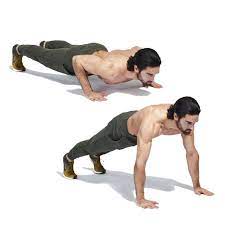The Benefits of Regular Exercise
Exercise is an essential component of a healthy lifestyle. Whether you prefer running, swimming, yoga, or weightlifting, engaging in regular physical activity can have numerous benefits for your overall well-being.
Physical Health
Regular exercise helps to improve cardiovascular health, strengthen muscles and bones, and boost your immune system. It can also help in maintaining a healthy weight and reducing the risk of chronic diseases such as heart disease, diabetes, and obesity.
Mental Health
Exercise is not only beneficial for your physical health but also for your mental well-being. Physical activity releases endorphins, which are known as “feel-good” hormones that can help reduce stress, anxiety, and symptoms of depression. Regular exercise can also improve cognitive function and enhance overall mood.
Social Benefits
Engaging in group exercises or team sports can provide social benefits by fostering connections with others who share similar interests. It can help build relationships, enhance communication skills, and create a sense of community and belonging.
Tips for Starting an Exercise Routine
- Choose activities that you enjoy to make exercise more enjoyable and sustainable.
- Start slowly and gradually increase the intensity and duration of your workouts to prevent injuries.
- Set realistic goals and track your progress to stay motivated.
- Stay hydrated before, during, and after exercise sessions to maintain optimal performance.
- Listen to your body and rest when needed to avoid overtraining.
In conclusion, incorporating regular exercise into your daily routine can have a positive impact on both your physical and mental health. Whether you’re aiming to improve fitness levels, manage stress, or simply enjoy the benefits of an active lifestyle, making time for exercise is a worthwhile investment in your overall well-being.
6 Essential Exercise Tips for Optimal Fitness and Recovery
- Start with a warm-up to prepare your body for exercise.
- Mix cardio and strength training for overall fitness.
- Stay hydrated before, during, and after your workout.
- Listen to your body and rest when needed to prevent injuries.
- Set realistic goals and track your progress to stay motivated.
- Don’t forget to cool down after your workout to help with recovery.
Start with a warm-up to prepare your body for exercise.
Starting with a warm-up is a crucial step in any exercise routine as it helps prepare your body for physical activity. A proper warm-up increases blood flow to the muscles, raises body temperature, and loosens joints, reducing the risk of injury during subsequent exercise. By incorporating dynamic movements and gentle stretches into your warm-up, you can gradually increase your heart rate and flexibility, priming your body for a more effective and safe workout session. Remember, taking the time to warm up not only enhances your performance but also contributes to overall fitness progress in the long run.
Mix cardio and strength training for overall fitness.
To achieve comprehensive fitness, it is recommended to incorporate a combination of cardio and strength training into your exercise routine. Cardiovascular activities such as running, cycling, or swimming help improve heart health, burn calories, and enhance endurance. On the other hand, strength training exercises like weightlifting or bodyweight workouts help build muscle strength, increase metabolism, and improve overall body composition. By combining both forms of exercise, you can effectively target different aspects of fitness, leading to a well-rounded and balanced approach to improving your overall health and well-being.
Stay hydrated before, during, and after your workout.
Staying hydrated before, during, and after your workout is crucial for maintaining optimal performance and promoting overall well-being. Proper hydration helps regulate body temperature, lubricate joints, and transport nutrients to cells. Dehydration can lead to fatigue, muscle cramps, and decreased exercise performance. By drinking an adequate amount of water before, during, and after exercise, you can ensure that your body stays hydrated and functions at its best. Remember to listen to your body’s thirst cues and make it a habit to keep a water bottle handy during your workouts to stay properly hydrated throughout your fitness routine.
Listen to your body and rest when needed to prevent injuries.
Listening to your body and taking adequate rest when needed is crucial in preventing injuries during exercise. Pushing yourself too hard without giving your body time to recover can lead to overtraining and increased risk of strains, sprains, or other injuries. Resting allows your muscles to repair and rebuild, ultimately improving your overall performance and reducing the likelihood of setbacks. By tuning in to your body’s signals and respecting its limits, you can maintain a safe and sustainable exercise routine that promotes long-term health and well-being.
Set realistic goals and track your progress to stay motivated.
Setting realistic goals and tracking your progress are key strategies to staying motivated in your exercise routine. By establishing achievable milestones, you can measure your improvement over time and celebrate your successes, no matter how small. Tracking your progress not only helps you stay focused and accountable but also provides a sense of accomplishment as you see yourself getting closer to your fitness objectives. This proactive approach not only boosts motivation but also encourages consistency and long-term adherence to your exercise regimen.
Don’t forget to cool down after your workout to help with recovery.
After completing your workout, it is important not to overlook the significance of a proper cool down. Taking the time to cool down after exercise can greatly aid in the recovery process. Cooling down allows your heart rate and breathing to gradually return to normal, helps prevent muscle soreness, and promotes flexibility. By incorporating a cool down routine into your workout regimen, you can enhance your overall recovery and ensure that your body is well-prepared for future exercise sessions.

Leave a Reply